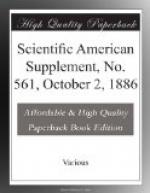On the morning of the 4th the people thronged again to the Heiliggeistkirche to listen to the address of the Geheimrath, Dr. Kuno Fischer, on the fate of the Palatinate and Heidelberg, which was preceded and followed by music. After this the participants in the festival were brought together by a dinner in the Museum Hall, and seldom have speeches so inspired an audience as did those of the Grand Duke and the Crown Prince. Never has Heidelberg seen such a torch-light procession as that formed by the students in honor of their Rector; 3,000 torches lighted him to the City Hall. He thanked them, and proposed cheers for the Crown Prince.
On the morning of the 5th there was the presentation of degrees. In the afternoon a special train carried four hundred people to Karlsruhe, where the royal party held a great reception. The capital was decorated with flags, the city parks were lighted with Bengal lights, there was music, and a song by the patriotic bard Vierordt was sung.
All the splendor and interest shrank into insignificance before the grand historical procession on the morning of the 6th, which made a lasting impression on the minds of all. The throng of 100,000 people watched quietly while the whole history of the Palatinate passed in review before them. The procession illustrated this history much better than it could have been told by any professor or any book. There was not a vacant space to be found, extra trains having brought more spectators, and yet everything passed off quietly and without accident. In the evening there was a heavy shower, which freshened everything, leaving no ill effects to be seen the next morning, which was more than could be said of many of those who attended the imposing Commerse of the Heidelberg students. As a former student, the Grand Duke appeared among the 6,000 visitors at the Commerse, where he presided and spoke enthusiastically of the Emperor. Other speeches followed, until the conversation became so animated that even Von Treitschke, who was received with an ovation, could not be heard. At midnight the court retired and the Fidelitas succeeded to their rights.
On the 7th the time was spent in excursions and carousing until the illumination of the castle began. I never saw an illumination of the ruins which could compare in beauty with that of the 7th. The night was favorable for fireworks, until finally they were rivaled by the moon, numerous boats trimmed with colored lanterns passed along the river, there were fire-wheels on the bridge, water fireworks on the river, and the quiet was disturbed alternately by the rockets and music, and when the names of the Grand Duke and Duchess, crowned with brilliant fire, appeared over the water, there was an involuntary outburst of enthusiasm. If the old Elector and Electoress could have been present at the closing entertainment of the jubilee, on the evening of the 8th, they would have rejoiced to see the new life brought to the ruins by their successor.—Illustrirte Zeitung.




